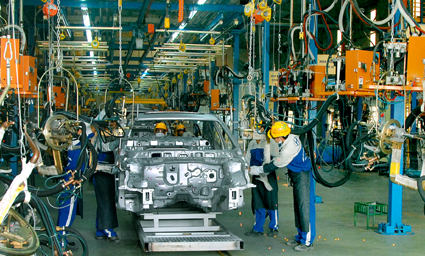Taiwanese eye fresh FTA prospects

illustration photo - source internet
Berton B.C. Chiu, a counselor for Regional Economic Integration Projects at Taiwan’s Ministry of Economic Affairs’ Bureau of Foreign Trade, told VIR that a bigger wave of Taiwanese investors would come to Vietnam to invest in, as they saw enormous investment and trade benefits from the country’s multilateral and bilateral free trade agreements (FTAs).
He said Taiwanese businesses strategically wanted to use Vietnam as a base and set up partnerships with the Vietnamese in order to put regional economic integration and supply chain efficiency to good use. They wished to invest largely in Vietnam’s agriculture, textile, ICT, and car/motorcycle component sectors.
Jack Lin, associate director of the general manager office of Taiwan’s I-Mei Foods Co., Ltd., said “Vietnam’s economic situation is strongly recovering and the country has had many FTAs with great tax reductions. This will offer a good opportunity for us to expand production here. We may increase our investment in Vietnam.”
Currently, I-Mei operates a factory in Hanoi making rice biscuits.
Sara Huang, representative from ceramic-maker Taiwan’s Franz Collection Inc. also told VIR that this company was finding Vietnamese distributors to sell its products in Vietnam as imported tax rates for ceramic products under the FTAs would be significantly reduced.
“Vietnam’s demand for products like ours is on the rise, thanks to the economic recovery. After we establish a strong partner network in Vietnam, we may consider other investment-related steps in Vietnam,” she said.
Referring to the textile sector, Chiu underlined that Vietnam had signed FTAs with many important trading partners and could sign the Trans-Pacific Partnership Agreement (TPP) in the near future, thus allowing it to enjoy preferential tariffs. Taiwan’s textile sector, however, was facing pressure from regional economic integration trends.
“The sector is looking towards Vietnam as a manufacturing base. It will be able to produce high-quality fibre, gauze and cloth that can supply the local finished clothing sector, which can then in turn supply ASEAN members, mainland China, Japan, South Korea and Europe,” he said.
Chiu also stressed that Vietnam’s automobile and motorcycle parts industry was a magnet to Taiwanese investors. After Vietnam joined the World Trade Organization, its government adopted a policy of extending more preferential tariff treatments to specific auto and motorcycle parts than to the whole vehicle, and since then, the tariffs on parts have gradually been decreased. Also based on ASEAN’s Common Effective Preferential Tariff (CEPT), starting on January 1, 2014, Vietnam has begun lowering import tariffs on automobiles and motorcycles to below 50 per cent and by 2018 these will be reduced to 0 per cent.
Currently, Vietnam still relies on imports for several components whose assemblies require relatively advanced technical capability. Its domestic producers exclusively create tyres, bodies, seats and lights.
“We would recommend that businesses of both sides form joint ventures with technical co-operation to enter the local market. They may also, in line with the demand from overseas customers or international producers, establish their plants in Vietnam. They can also merge with or acquire local parts from producers,” Chiu said.
During 1988-2014, Taiwanese businesses invested $28.41 billion in 2,368 investment projects in Vietnam, making Taiwan Vietnam’s fourth largest source of foreign direct investment (FDI). This makes Taiwan’s share at 11.33 per cent of Vietnam’s total FDI that currently employs a total of 1.4 million Vietnamese workers.
Currently 83 per cent of Taiwan’s investment projects are focused in manufacturing and agricultural sectors like steel, textile and garments, tea, mushrooms, pork and fish.
Vietnam has had six multilateral FTAs with ASEAN, and their partners including India, Australia/New Zealand, South Korea, Japan and China. It also has two bilateral FTAs with Japan and Chile.
Vietnam is also negotiating seven FTAs including the Regional Comprehensive Economic Partnership Agreement, ASEAN-EU FTA, the Trans-Pacific Partnership, Vietnam-EU FTA, Vietnam-South Korea FTA, Vietnam-Eurasian Economic Union, and Vietnam-European Free Trade Association (Switzerland, Norway, Liechtenstein, and Iceland). Furthermore, Vietnam is also considering negotiations of the ASEAN - Canada FTA.
What the stars mean:
★ Poor ★ ★ Promising ★★★ Good ★★★★ Very good ★★★★★ Exceptional
Latest News
More News
- Site clearance work launched for Dung Quat refinery upgrade (February 04, 2026 | 18:06)
- Masan High-Tech Materials reports profit: a view from Nui Phao mine (February 04, 2026 | 16:13)
- Hermes joins Long Thanh cargo terminal development (February 04, 2026 | 15:59)
- SCG enhances production and distribution in Vietnam (February 04, 2026 | 08:00)
- UNIVACCO strengthens Asia expansion with Vietnam facility (February 03, 2026 | 08:00)
- Cai Mep Ha Port project wins approval with $1.95bn investment (February 02, 2026 | 16:17)
- Repositioning Vietnam in Asia’s manufacturing race (February 02, 2026 | 16:00)
- Manufacturing growth remains solid in early 2026 (February 02, 2026 | 15:28)
- Navigating venture capital trends across the continent (February 02, 2026 | 14:00)
- Motivations to achieve high growth (February 02, 2026 | 11:00)
















 Mobile Version
Mobile Version